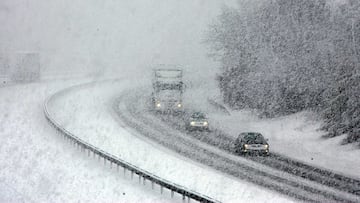How to protect your car during severe winter weather: Tips from the pros
Extending the life of your car can be more difficult in areas with colder winters. Here are a few tips to protect your car from cold conditions as winter approaches.

Winter storm warnings are beginning to be issued as the US moves into the colder months of the year. When it comes to taking care of your car and driving in the winter there are a few reminders and tips that are helpful to remember as the season kicks off.
A strong arctic cold front will sweep from the Great Lakes through the Mid-Atlantic and into the Northeast through Thursday. This will bring a high chance for dangerous snow squalls, locally damaging wind, and heavy snowfall. Be prepared for dangerous travel conditions. pic.twitter.com/ia81smyTMU
— NWS Weather Prediction Center (@NWSWPC) December 4, 2024
When powerful storms move through, staying home with enough food and water is your safest bet, so long as the power remains on. However some Americans may have to make car journeys in the coming days, so how best can you prepare your car for travel in winter weather? Car insurance providers GEICO have outlined some of the key things to do before heading out into the snow…
Check for vehicle recalls
It may seem unlikely but it is worth checking to see if your car has been the subject of a manufacturer recall before taking to the snowy roads. You can do so easily and quickly using the NHTSA’s Recalls Look-Up Tool and entering your Vehicle Identification Number (VIN) to see if it has been recalled in the last 15 years. Though unlikely, snow tires are a safety feature that many who live in cold areas rely on, and if they are defective, you will want to know before you attach them to your vehicle and head off on a snowy day.
Get a car service
Now is the perfect time for a seasonal check-up to ensure that any routine maintenance is up to date. This can include searching for leaks and worn hoses and should include a test of your car’s battery health to ensure that you don’t get stranded.
Check the tires
Perhaps the most crucial and common preparation before winter driving is to check the state of your vehicle’s tires. You should check both the tire pressure and the overall wear on the tire, remembering to give your spare tire a once-over, too. Check the manufacturer’s recommendation on tire pressure, tread definition, and lifespan.
Consider getting new windshield wipers
Wipers capable of brushing aside a few spots of rain may seem inadequate when faced with snow and ice in the next few weeks. If your wipers appear worn, you should consider replacing them with heavy-duty winter wipers.
Check engine fluids
Your windshield washer fluid should include a de-icer to prevent any moisture on the glass from icing up. It’s also worth keeping extra in your vehicle, as drivers can use a lot of the product in extreme conditions.
Test signals and lights before heading out
Winter storms bring a dangerous combination of slippy road conditions and poor visibility, so you should make sure that all signals and lights are working well. This includes brake lights, turn signals, emergency flashers, and headlights.
Make sure heating systems are functioning
Related stories
It’s important to check that your car’s internal heating system and window defroster are functioning properly before heading out into a winter storm. Not only will this make your journey more comfortable, but maintaining a safe temperature also helps you stay focused on the road.
Bring a car safety kit
No matter how much preparation you do, there is always an element of risk when driving during extreme weather, so you should prepare for the worst. Keeping a car safety kit in your car at all times will give you that extra peace of mind and could be invaluable if things go wrong. GEICO has issued a comprehensive list of Winter Driving Safety Kit Essentials which includes an ice scraper, blanket, first-aid kit and even a flare.


Complete your personal details to comment